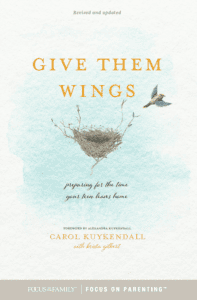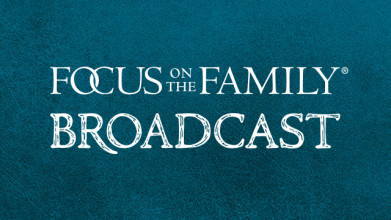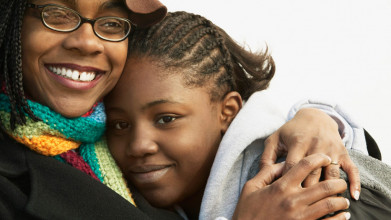
The War of Words
In this Adventures in Odyssey drama, a carelessly uttered word from Eugene creates havoc as it becomes the fashionable insult, resulting in a lesson about the power of words.
Home » Episodes » Focus on the Family Broadcast » Setting Your Teen Free to Soar
Preview:
Carol Kuykendall: I would just would wanna encourage mothers and fathers who are going through this and getting, seeing it in their window, that it’s coming, that the best is yet to come, that letting go-
End of Preview
Jim: That’s good to hear.
Carol: … of your children and helping them become confident adults is the bridge to the very best season of parenting, and that is to be friends with your adult children.
John Fuller: That’s Carol Kuykendall and she’s with us today on Focus on the Family, along with her daughter-in-law, Alexandra Kuykendall. And your host is Focus President and author Jim Daly. Thanks for joining us. I’m John Fuller.
Jim Daly: Uh John. When your oldest Dakota left home, how did that make you feel?
John: Oh man. I did-
Jim: (laughs)
John: It snuck up on me. I was so excited for him. We got to the airport ’cause he flew to his, uh, the s-, the school he was going to, and I was so happy for him. And the sense of dread came over me as well, because I realized I’m saying goodbye to him right now, I’m always going to be saying goodbye to him in some capacity. He’s never gonna come back and just, it’s never gonna be the same. So it was a really mixed, uh, mixed emotions.
Carol: Mm-hmm.
Jim: I think that’s the way it is. I mean it’s happy and sad all at the same time.
John: Yeah.
Jim: I remember Trent moving out. He moved into some college apartments, uh, last year and, uh, yeah, it was really crazy just, uh, feeling that you’re on your own now.
John: Yeah.
Jim: I mean we’re here for you, but you know.
John: You’re, you’re excited, but also-
Jim: (laughs)
John: Yeah.
Jim: Right. But it, it is a moment it’s a demarcation of a change in the relationship.
John: Yes.
Jim: And hopefully the things that you’ve done to pour into that child, whether it’s, uh, you know, a son or a daughter, that the fruit of that is gonna take root and, uh, I’m really proud of Trent. I think he’s done a great job. And Troy’s still at home. He’s doing a gap year. So we’re gonna, you know, be working on that over the next year or two and see where he’s gonna go to college or do something vocationally. So we’re looking forward to it. But, um, I think this speaks to so many parents today, because you, especially moms, if I could speak directly to you, watching Jean in this. I mean, you’re doing everything as that little child grows and you’re taking care of that little baby and then elementary school and junior high and high school and all those things that you gotta do to comfort that son or daughter. And then the day comes, they’re walking out the door. And so many moms, you know, you can wrap your identity around being that mom. And now you’re gonna move to an adult-adult relationship and it’s tough.
John: Mm-hmm.
Jim: But we’re gonna discuss that today with two very good guests.
John: Yeah. We have some really, uh, practical insights into this, uh, phase of life when you launch your teens into the adult world. And, uh, Carol Kuykendall has raised and launched three adults. Um, m- her son married her daughter-in-law, who’s with us, Alexandra. And, um, Alexandra and her husband have recently sent their oldest off. And so, uh, I think is kind of a fresh topic for her.
Jim: We’re all experiencing it.
John: Yeah.
Jim: (laughs)
John: Yeah. Uh, so both of these ladies are quite accomplished. They’ve written a number of books. Today, we’re talking about one that, um, is written by Carol and it’s called Give Them Wings: Preparing for the Time Your Teens Leave Home. It’s a terrific resource.
Carol: Mm-hmm.
John: Get a copy of that book from us here at Focus on the Family. Our number is 800 the letter A, and the word FAMILY, or stop by focusonthefamily.com/broadcast.
Jim: Carol and Alex, welcome to focus again.
Alexandra Kuykendall: Oh, thank you.
Carol: Thank you.
Jim: It’s been a while Carol, since you’ve been here.
Carol: It has been a while.
Jim: But it’s great to have you back-
Carol: Thank you.
Jim: … and, uh, let’s get into it because we only have a few minutes.
Carol: (laughs)
Jim: So, you know, when a child moves out of the home, whether it’s, uh, to go to college or start their vocational, uh, future, it’s exciting. And it is frightening kind of what John, and I were bantering about a moment ago. W- why do those feelings hit us so suddenly? We know it’s coming. I mean, it’s gonna be 18, 19, roughly. It might have some late bloomers that have to hang on for economic reasons, but 18, 19, 20, they’re pretty much gonna be out of the house. So why, why is it, uh, a sudden shock to us as parents?
Carol: Well, I think that we do see it coming. There are pivot points all the way along, like the first time your child if, goes to preschool that, that’s a pivot that-
Jim: No, you go with the child. That’s what Jean did. (laughs)
John: Yeah. (laughs)
Carol: Oh, yeah. And play with the blocks.
Jim: We didn’t send them up.
Carol: Yeah. Play with the- (laughs)
Jim: Yeah. We went to be, uh, volunteers. (laughs)
Carol: (laughs) Or the first time you leave your baby in the church, uh-
John: Nursery. Yeah.
Carol: Nursery, uh, you know, so you do have those flashes of it. But I think when a child gets to high school age, I, I call high school the home stretch of parenting. And, uh, there are lots of, lots of pivot points and getting a, a driver’s license and getting the phone that probably came earlier. But all those things that give them more responsibility that are adult responsibilities. So I really felt it m- mostly through high school.
Jim: Yeah.
Carol: It just felt like, “This is the road you’re on.” And what is real is that your family will be changed forever. No, that doesn’t mean it won’t get good.
Jim: Yeah.
Carol: It will get good. But it’s that moment that you realize… I, I mean, I remember walking into the kitchen when Derek was just eating, uh, cereal at the breakfast bar- (laughs)
Jim: And this is Alex’s husband, right?
Carol: Yes. Yes. I know.
Jim: (laughs)
Carol: That makes it sort of awkward- (laughs)
Jim: (laughs)
John: (laughs)
Carol: … to talk about him as mother. Yeah, I know.
Jim: Let’s get it out on the table here.
Carol: It’s not right.
Jim: So, but this is back when he was still eating cereal, (laughs)-
Carol: Eating cereal at the-
Alexandra: In high school.
Carol: … at, in high school at the kitchen counter. And I just suddenly started crying because I realized that would be a hole in the setting for the rest of-
Jim: Okay. (laughing) Did you freak him out-
Carol: No, you know what?
Jim: … starting to cry in front of him?
Carol: No, it actually was a tender moment-
Jim: Oh, that’s good.
Carol: … because I walked over and gave him a hug and said, “I’m sorry, I just sometimes have to hug you.”
Jim: Yeah.
Carol: And he said, “I know, mom.”
Jim: Well, and that’s, that’s really the next question-
Alexandra: Mm-hmm.
Jim: … which is, you know, letting go is actually a good thing, but it can be so hard. I think too, I’m sure every generation feels this, where you’re saying, you know, “To let my child go in this culture with all the problems.” I’m sure that was true of the ’60s-
Alexandra: Mm-hmm.
Jim: … and the ’70s-
Alexandra: Yeah.
Jim: … and the ’80s, and you get the picture. But there is that, um, fear if I could call it that-
Alexandra: Of course.
Jim: … that you’re letting your, your little baby go into this brutal world, but, but they’ve gotta do it. I mean, you can’t smother them, right, Alex?
Alexandra: Mm-hmm. Yeah. It’s trusting that God has gone before them, that God is with them. And it is scary. You just open your phone or look at the headlines and you know this world is a scary place. And that panic you can feel in that moment where you’re saying goodbye of, “Did we do enough? Did we prepare this child enough?” And I think for parents, yes and no, because we’ve all done the best we could do, and we’ve been faithful in planting seeds of truth and hope in them. And we have to trust God to work in them as they go out into the world, and you can always do more. So the- there’s that feeling of yes and no and trusting God in that as you let them-
Jim: Let me get that out in the discussion quickly so that moms and dads can put themselves at ease. I, I think Jean and I have talked about this, “Boy, if we could have a do over-”
Alexandra: Mm-hmm.
Jim: “… we would be such better parents in so many ways.” And I think most earnest parents would say that. You don’t do everything perfectly. It’s the first time you’ve done this.
Alexandra: Mm-hmm.
Jim: It’s the first time you’ve learned to let go. You may not do it well. Um, we’re here to encourage you to do it well, but speak to that, Carol, what were some of the things that you learned in that letting go experience that parent right now that have high school kids need to hear?
Carol: Well, you’re unfinished when they leave home. And that’s a reality, that, um, the application of what they’ve learned is now going to have an opportunity (laughs) to be put in practice. And so the first year for, um, someone who leaves home, uh, I think they’re learning more than they learned their s- their senior year in high school because they’re having to apply it in a way that’s very different from when you’re at home and you do have parents.
Jim: Yeah. Like pay the electric bill.
Carol: Yes.
Jim: (laughs)
John: (laughs)
Carol: Yes.
Jim: Let’s just start with that one.
Alexandra: Mm-hmm.
Carol: And if I n-
Jim: The phone bill, what have you.
Carol: Yeah, I know. And, and that I can find what I need by going to the refrigerator or the, (laughs) the cupboard. So-
Jim: I mean, somebody has to put that stuff in the fridge.
Carol: Yeah. The, the… Yes.
Jim: (laughs)
Carol: So to say that your, your son went to, uh, his first rental home, is that what it is?
Jim: Yeah. Well, originally, now he’s renting from a friend on the-
Carol: Okay.
Jim: … in the house.
Carol: Okay.
Jim: Yeah.
Carol: But then they do have to start figuring-
Jim: Yeah.
Carol: … all those more adult stu- type responsibilities. So, uh, I-
Jim: Which again is part of the process.
Carol: Yes.
Jim: Yeah.
Carol: It is part of the process and I just think for the family at home, it just feels hard to recognize that we’re gonna be different. And I pictured one of those children’s mobiles that hangs over a crib, and if you pull one of the characters out of that, I mean, it just goes like this.
John: Mm-hmm.
Jim: It’s unbalanced.
Carol: It’s totally unbalanced-
John: (laughs) Yeah.
Carol: … but it comes back to a place of settlement. And what, what we all learn is that we get better at home, and they get better away from home.
Jim: Uh, Carol, in fact, with Derek, uh, Alex’s husband, um, you said in the book, God gave you one question.
Carol: Yeah.
Jim: What was the question?
John: Hmm.
Carol: Well, if I’m referring to the, what you’re referring to, I was really mad at God that He had given us family and we really tried to love each other the way that He tells us to love each other. And then you take someone away. Why is that the way the plan for a family? And, uh, I realized in, uh, perspective that He doesn’t take a child away. He changes the shape of a family.
Jim: Yeah.
Carol: And so that helped me, but I have a feeling you might have had a different question.
Jim: No, that’s it. No, that’s it.
Carol: Okay. That is it. Okay.
Jim: The, um, I think the thing that you referred to a little while ago, those pivot points, let me come to you Alex and ask you in those pivot points. I think, you know, there’s obvious ones. You send them off to school.
Alexandra: Mm-hmm.
Jim: That’s a big one. The license is a big one.
Alexandra: Mm-hmm.
Jim: Their cell phone is a big one. Um, what are some of those other pivot points that you notice with your kids?
Alexandra: Yeah. We’re at all kinds of stages ’cause we have a 10-year-old, a 12-year-old, a 16-year-old and a 19-year-old. So-
Jim: Good planning.
Alexandra: All of-
Jim: (laughs)
Alexandra: Everyone is in a process of letting go in… Well, as parents, we’re letting go in different ways-
Jim: Mm-hmm.
Alexandra: … and we have to pick age-appropriate ways for them to, uh, separate from us and for us to give them more responsibility. So, uh, just this month we had our 16-year-old decided she didn’t wanna try out for the high school soccer team, and we, as parents were disappointed-
Jim: Hmm.
Alexandra: … because she’s a great athlete. We thought it would be good for her, but she had reasons why she didn’t want to. And we decided as parents, “Okay, you’re at an age where this is a decision that is up to you, and we will support you either way. Even though we had opinions that were different from the decision, um, she was going to make. It wasn’t a safety issue. So we could allow her to have that space-
Jim: Yeah.
Alexandra: … to make that decision. Um, and then we also had some parameters around, “Okay, this is how you need to use your time if you’re not gonna be using it this way.” So we were still guiding her in that. But to allow our kids to make decisions that are bigger and bigger, as they get older has been a learning process for us.
Jim: Well, and you’re reinforcing critical things that parents need to do at that point of adolescence, you know. And I think we had Dr. Ken Wilgus on the program. He wrote a really good book called Feeding the Mouth That Bites You.
John: (laughs) That’s great.
Alexandra: Okay (laughing). That’s great.
Jim: How to emancipate your teenagers-
Alexandra: Uh-huh.
Jim: And I love the title, but his whole point there is, you hand over responsibility in those teen years and you don’t take it back.
Alexandra: Mm-hmm.
Jim: So if that’s, you know, they gotta get their room clean, they gotta do whatever that they need to start functioning as adults before they leave the home-
Alexandra: Mm-hmm.
Jim: … so that they can function as adults when they leave the home.
Alexandra: Yeah. And that’s hard for me, ’cause as a mom, I want to take care of my kids. I love doing it. And I know that the time is limited. So with our oldest daughter, she left for college in the fall, uh, that… Her whole senior year I kept thinking, “This is the last time I’ll have a chance to do this for her. So I’m happy to do it for her.” And my husband was a little bit more like, “You need to stop doing that for her so that she can practice while she’s at home-”
Jim: Hmm.
Alexandra: “… and we can coach her how to do some of these practical things.” So sometimes in a family too, there’s a parent who’s a little more, uh, willing to step in and do things for kids that they can do themselves. Uh, and another parent who’s a little more, “Let’s push them to work towards independence.” And sometimes it’s that mom-dad dynamic.
Jim: Well, we all seem to come from big families or have big families like you do. I think there’s a difference with birth order too.
Alexandra: Mm-hmm.
Jim: Uh, John you’re a first born.
John: I am, yes.
Jim: I’m a last born.
John: (laughs)
Jim: But I think firstborns get a lot of that attention, right? Parents are jumping in. It’s the first time. We clean up the nook. Every time it falls out of their mouth, we wash it off. But the last borns, like me, I mean, parents are like, whatever.
John: You get the leftovers. (laughs)
Carol: Let the dog-
Jim: I know. Yeah. (laughing)
Carol: Let the dog lick it.
John: (laughs)
Alexandra: (laughing) Yeah. Right?
Jim: There is a difference there. It’s like you fend for yourself, you know. I’m three years old making my own hot dogs. (laughs) But there is some of that to the birth order.
Carol: Mm-hmm.
Jim: Have you found that to be true?
Carol: Oh yes. Oh for sure. Yeah. My mother used to say, “You have to throw away the first one because-”
Jim: (laughs)
Carol: “… they just don’t do everything-”
Jim: (laughing) Sorry, John.
John: Yeah.
Jim: I didn’t mean that. (laughing)
Carol: (laughs) But it is true that you, you learn, you learn from the experience.
Jim: Yeah.
Carol: And it’s a good thing because raising children, you have to constantly change the way you love them and show your love for them. And you have to stop at those pivot points. That’s where it’s a good place to say, “What are we gonna do with the, the…” They’re getting a phone or what’s the responsibility? What are the new rules that, uh-?
Jim: Yeah.
Carol: … we, we check in with that. So we’re always changing the way that we love our children.
Jim: In fact, in the book, you mentioned planting seeds, that’s God’s responsibility. Ours is to-
Carol: Nurture.
Jim: … nurture the seeds.
Carol: Right.
Jim: I could think of that in both directions but explain more of what you’re getting at.
Carol: Well, being a woman who was blessed to have three children from pregnancy, I have a great deal of respect for the creator’s role in that. And allowing me to be part of a miracle that I will remember for the rest of my life that-
Jim: Hmm.
Carol: So when he’s knitting together, this baby in, within a mother, I believe he’s planting seeds-
Jim: Huh.
Carol: … and that we are trying to find who he made this child to be and, uh, respecting that and parenting in a way that helps to grow those seeds and the- they’re different, you know. The children we have are all different. So we have to be the tiller of the soil to use the right kind of fertilizer and, um, really encourage this child to become who God made him to be.
Jim: Well, I like that reinforcement in knowing each child uniquely-
Carol: Mm-hmm.
Jim: … because, uh, there isn’t blanket parenting.
Carol: Mm-mm.
Jim: You can’t just use an approach.
Carol: No. Yeah.
Jim: I mean, you gotta know your kids well enough to know they’re bent just like the scripture says-
Carol: Mm-hmm.
Jim: … and to train them and raise them up in the admonition of the Lord.
John: Hmm. This is Focus on the Family with Jim Daly, and today our guests are Carol Kuykendall and Alex Kuykendall. And uh, Carol has written a book, Give Them Wings. It’s a Focus on the Family resource and we’d be happy to tell you more. Uh, stop by focusonthefamily.com/broadcast or give us a call, 800, the letter A, and the word FAMILY.
Jim: Alex, let me direct this one to you. Uh, Trent, my oldest, who’s now 21. He said something the other day that caught my attention. It was really kind, but he said-
Alexandra: (laughs)
Jim: … you know, “Dad, it’s just so fun to see our relationship blossom into like adult-adult discussion,” and I thought that was really cool that he notices I’m trying very hard to treat him differently-
Alexandra: Mm-hmm.
Jim: … now that he’s out on his own and it, it, it changes. Your daughter’s kind of that, in that same age range as Trent. So have you had that experience where I guess twofold one, the relationship is different and then how do we as mom and dad relate to our children in that different-
Alexandra: Mm-hmm.
Jim: … time of life.
Alexandra: Yeah. The relationship is different, and if we try to hold on to it being the same, it’s just not gonna go well, because they know it’s different. They’ve changed and we’ve changed as they’ve left the house. I’ve heard it said that kind of the young adult years are coaching years. If you put on the role of coach, then you are coming alongside a person, a young person and saying, “I see you doing this well, this is really great. And have you considered (laughs) trying it this way?”
Jim: Yeah.
Alexandra: And those gentle coaching approaches rather than the parental authority approach works better because it’s age appropriate. And so that has helped me, just even that term coach-
Jim: Right.
Alexandra: … has helped me as a mom say, “Okay, am I coaching her or am I trying to over-parent her?”
Jim: And I think it’s really important to have open discussion about that.
Alexandra: Mm-hmm.
Jim: I remember talking to Trent and asking him, “How, how do you wanna move forward? Do you… If I notice something-”
Alexandra: Mm-hmm.
Jim: “… do you want me to just tell you, or how do you want me to approach this?” And he said, “Yeah, I’ll, uh-”
Alexandra: Mm-hmm.
Jim: “… you know, I definitely want you to have permission to speak into my life.” And, and it’s just good to have that open dialogue with him and to say, you know, “Things are changing. You’re now on your own. I gotta see you differently.”
Alexandra: Mm-hmm.
Jim: “You’re not just my son. You’ll always be my son-”
Alexandra: Mm-hmm.
Jim: “… but now you’re an adult and I’ve got to; I’ve got to look at you differently. So how do you want me to, you know, talk with you in those ways? So I, I would just ask.
Alexandra: Yeah. And, and I think for parents, when kids come back for Christmas break or summer break, there’s that adjustment period of they’ve had all this freedom and you’re not used to them having all of this freedom-
Jim: (laughs)
Alexandra: … while they’ve been at home.
Jim: Isn’t that the truth?
Alexandra: And so having an honest conversation there too, and the way we’ve approached it, especially as she was a senior and we knew she was starting to get ready to leave the home and then as she’s come home to say, “We still worry about you. So consider us your housemates. Be as respectful as you would with, um, your housemates, as far as letting us know what time you expect to be home. Text me when you get home so that if I wake up at three o’clock in the morning, I know that you’re home. I don’t have to get up and check your room kind of thing.” But I think having that expectation early on and then modeling, “I don’t stay out till all hours of the night-”
Jim: Right.
Alexandra: “… and not tell daddy. Like he knows where I am.” It’s that respect that we also model as other adults in the house.
Jim: Yeah. And I think, of course, some parents are going, “Well, you don’t have my son, you don’t have my daughter.”
Alexandra: Uh-huh.
Jim: We realize that some-
Alexandra: Mm-hmm.
Jim: … there’s gonna be some difficulty in some of those relationships and things are going on and culture has grabbed your child and you’re trying to cope with that. And you have to apply a different parenting approach. We’re kind of generally talking about just the normal household where someone’s left and they’re coming back for the weekend and how, how are you gonna treat them?
Alexandra: Right.
Jim: So-
Alexandra: Yeah.
Jim: Carol, let me ask you, uh, when Derek, who is your oldest (laughs) and is Alex’s husband.
Carol: Yes.
Jim: Again, I’ll keep telling everybody.
Carol: (laughs)
Jim: But, um, what was that experience for you when you, you know, from high school that summer, and then you drove him to college?
Carol: Oh gosh. (laughs) the summer before they leave is a mother’s time where we want, we should do everything together. This could be the last time that we, we’re going to church together in the same car, whatever. And a, a mother get… And parents I think get, get really intense about-
Jim: And emotional.
Carol: And emotional-
Jim: (laughs)
Carol: … but intense about family things.
Jim: Yeah.
Carol: And this is a child who is trying desperately to separate-
Jim: Mm-hmm.
Carol: … emotionally.
Jim: (laughing) right. I’m an adult.
Carol: I know.
John: Yeah. It’s a lot harder for us as parents.
Jim: (laughing)
Carol: I don’t wanna go.
John: Yeah.
Carol: I don’t want to get in the car. I wanna drive myself. Um, that kind of thing. And, uh, we just had to really be aware that our purposes were very different-
Jim: Hmm.
Carol: … and, uh, we were going… We packed up the car. This was gonna be a family trip to take him to college. And so we were just squished into a car with all of his things. And, um, I just had all these visions of here we are together in the car and we’re going to give him all the information we might have forgotten along the way.
Jim: Sure. Look at that open field, we can go walk in-
Carol: Oh, yes.
Jim: … and have lunch out there and a picnic.
Carol: Yes. A picnic together-
Jim: Ahhh (laughs).
Carol: … and, and pray, pray, pray.
Alexandra: Yeah. You’ll lead us in prayer.
Carol: (laughs) Yes. And-
Jim: And what happened?
Carol: Oh God.
Jim: (laughs)
Carol: It was, it was not good. (laughs)
Jim: (laughs)
Carol: They all put on the… They at that point had earphones that they could listen to-
Jim: Yeah. The headsets.
Carol: Headsets and they all got into their own worlds, and it was mom and dad sitting in the front seat, just going-
Jim: Yeah.
Carol: … you know, and, and really saying goodbye at a college campus. I encourage parents to really do their important times and moments before they get to the campus when everything is crazy and, um, they are out of sorts. They just wanna get on with it. Don’t wanna say goodbye. So, so, um, they’re just gonna try to get rid of that and, um, go have one nice meal out the night before you move in if you’ve taken him, them to college campus. And then whatever you wanna say to them say before the last moment, because we were all in Derek’s room and he looked at his watch and he said, “Oh my gosh, I’ve got a meeting.”
Jim: (laughs)
Carol: And he ran out. I mean, we just barely had time-
Jim: And you were about to tell him all the meaning of life.
Carol: Oh, yeah. I was ready to pray and, and be really, and we, we’d lost that moment-
Jim: Yeah.
Carol: … because in retrospect, I know that is the way he needed to do it.
Jim: Yeah.
Carol: He needed to leave, and he needed to be the one walking out and so when we got to the second one, Lindsay that we took to college, Derek was with us ’cause we were dropping her off first and then taking him back to his college campus. And he said, as we were getting ready for that goodbye, he said, “Let her walk away.”
Jim: Oh, interesting.
Carol: “Don’t we walk away.” So he, it, it, it confirmed that he needed that. That was-
Jim: Yeah.
Carol: … how he wanted to say goodbye and he-
Jim: That’s how he thought about it.
Carol: … thought it would be easier for Lindsay too-
Jim: Yeah.
Carol: … to walk away rather than her watching us walk away.
Jim: Yeah. And that’s good. Alex, you had that kind of experience, I think, uh, taking your daughter to college, right? You had the, the plan and then what happened?
Alexandra: Oh yeah. Right.
Jim: (laughs)
Alexandra: Well, we wanted to have that special dinner the night before and we’re a family of six. We sometimes forget, we don’t eat out very often with all six of us. We forget, we can’t just walk into a city-
Jim: That’s big table. (laughs)
Alexandra: … restaurant and say, “We’re here and we’re ready to be served.” So we walked into a restaurant in our neighborhood, and it was full, it was booked. And it was the place she wanted to go. And we’d had a plan and the plan was falling apart, but emotions were so high because we were taking her the next morning to campus. And so we ended up sitting in the parking lot in the car, people were cranky. She was anxious to get this dumb-
Jim: Dinner done. (laughs)
Alexandra: … dinner done because she had things to do.
Jim: I could so relate to this.
Alexandra: Yeah.
Jim: Yeah.
Alexandra: And the p-… And we as parents were so emotional and we just had to take a collective deep breath and say, “Okay, this isn’t turning out the way we thought it was going to. So what’s our plan B?” Go to plan B, try to do it quickly and-
Jim: Drive through. (laughs)
Alexandra: Yeah. (laughs) No, we did go sit down somewhere, but there are so many moments where you picture how it’s going to go and then it doesn’t go that way and that’s parenting, right?
Jim: Oh, yeah.
Alexandra: We pictured it was gonna go this way. It doesn’t go this way. So we’re gonna go on to plan B and to be prepared for that in this whole process of a young person leaving home, whether they’re going to college or they’re moving out, they’re joining the military, whatever it is to have an idea of how you’d like it to go and to hold those plans loosely.
Jim: Yeah. That is great advice. Let’s, in the last couple minutes here, let’s just talk about the grief process.
Alexandra: Mm-hmm.
Jim: ‘Cause there is a grieving-
Alexandra: Yes.
Jim: … in the loss of your child, that little kindergartner (laughs), you know?
Carol: Mm-hmm. Yeah. And that’s-
Jim: And you have to, you have to deal with it to be healthy, I think. And so, uh, Carol, you talked about that empty nest transition when the last one leaves and, uh, how did God teach you about grieving that loss?
Carol: Well, I had two other att- attempts or rehearsals-
Jim: Right.
Carol: … with the grief. So, uh, learning to process it with, especially other moms, because we, we seem to have a more alike response.
Jim: Yeah. There’s connectedness there.
Carol: Yes. But with your husband too, because that’s a very important time in a marriage. And we talked about it long before we took the last one to college. And so, um, we were more ready for it because we’d done it slowly and that was the final one. Uh, so I think being aware that your marriage is gonna change and you’re gonna go through different responses, at first, it was just great fun.
Jim: (laughs)
Carol: You know, we didn’t have to go get the right kind of food for the one who wanted this or this or this. Uh, we had a great, um, a great feeling of freedom ourselves. And actually it came more further down the road when we realized, “Gosh, we really miss loving someone together that’s right here.”
John: Hmm.
Carol: And, um, that was impo- important part of our marriage is loving someone together. That’s when we got a dog.
John: Yeah.
Jim: (laughs)
John: (laughs)
Carol: And truly, uh, you know, for a marriage that, that does that well together, loving something, someone together, that’s a very helpful change.
Jim: Yeah. Well this has been great. I mean, so many, uh, bits and pieces of wisdom to guide that transition time. And I think that the biggest thing is try to be that cheerleader. What you said a moment ago, don’t hang on to the five-year-old that was so adorable.
Carol: Mm-hmm.
Jim: But you’re now cheering that young adult on, into a pretty aggressive world.
Carol: Mm-hmm.
Jim: And they’re gonna need to know who they are.
Carol: Mm-hmm.
Jim: Hopefully that work’s been done, that they have identity in Christ-
Carol: Mm-hmm.
Jim: … and they know where they’re driving and whatever they’re stepping into, they have confidence to do it. Um, and really mom and dad, you play the role in es- establishing that kind of foundation. But what a great resource, Give Them Wings. I think it’s a wonderful resource for every parent to have. And you can get that directly here from Focus on the Family. And I would encourage you to get involved with the ministry. If you can make a gift of any amount or, uh, maybe become a monthly sustainer. We’ll send a copy of the book as our way of saying thank you for helping others through Focus on the Family.
John: Yeah. Donate as you can and, uh, request this book, Give Them Wings. Our number is 800, the letter A, and the word FAMILY. 800-232-6459, or stop by focusonthefamily.com/broadcast. On behalf of Jim Daly and the entire team, thanks for joining us today for Focus on the Family. I’m John Fuller, inviting you back as we once more help you and your family thrive in Christ.

Carol Kuykendall has authored and co-authored nine books about families and parenting. including Five-Star Families: Moving Yours from Good to Great, Real Moms, What Every Child Needs, Children Change a Marriage and Give Them Wings: Encourage Your Young Adult to Transition into Adulthood Well. She and her husband live in Boulder, CO. To learn more about Carol, visit carolkuykendall.com or connect with her on Facebook.

Receive the book Give Them Wings for your donation of any amount!

Visit our online store and purchase a CD of today's program for yourself or to share with a friend.

Dr. Kenneth Wilgus, Jessica Pfeiffer, and Ashley Parrish, who together host a podcast about parenting teens, offer practical guidance for preparing teen children for adulthood. Our panel addresses topics including "planned emancipation," appropriate boundaries, control vs. influence, teen entitlement, and much more.

College professor and author Alex Chediak offers advice to parents on guiding their teens toward academic and career success.

Jill Savage offers encouragement and insight to parents facing the challenges that come with reorienting their lives after their children leave home.

Marci Seither offers soon-to-be empty nest parents practical advice for helping their children transition to adulthood while preparing for their own transition to life without kids at home.

Author Michele Howe discusses the transition parents have to make to establish a new identity and parenting role when their children leave home.

Do you ever wonder how you can help your teens feel loved? Consider how they might tend to feel more appreciated through one specific love language.

Your goal is to learn about your teen, and it will take some time.

Training teens for the work world requires a strong emphasis on work ethic, developing social skills, and guidance on the biblical perspective on work.

In this Adventures in Odyssey drama, a carelessly uttered word from Eugene creates havoc as it becomes the fashionable insult, resulting in a lesson about the power of words.

This discussion offers a preview of Volume #16 “Cultures in Conflict” from the That The World May Know video series, available below.

Debra Fileta will help couples better understand the four seasons of healthy relationships, what to expect during each one, and how to carefully navigate them for a stronger marriage. (Part 1 of 2)

Larnelle Harris shares stories about how God redeemed the dysfunctional past of his parents, the many African-American teachers who sacrificed their time and energy to give young men like himself a better future, and how his faithfulness to godly principles gave him greater opportunities and career success than anything else.

Amy Carroll shares how her perfectionism led to her being discontent in her marriage for over a decade, how she learned to find value in who Christ is, not in what she does, and practical ways everyone can accept the messiness of marriage and of life.

Jonathan McKee offers parents practical advice and encouragement in a discussion based on his book If I Had a Parenting Do Over: 7 Vital Changes I’d Make.